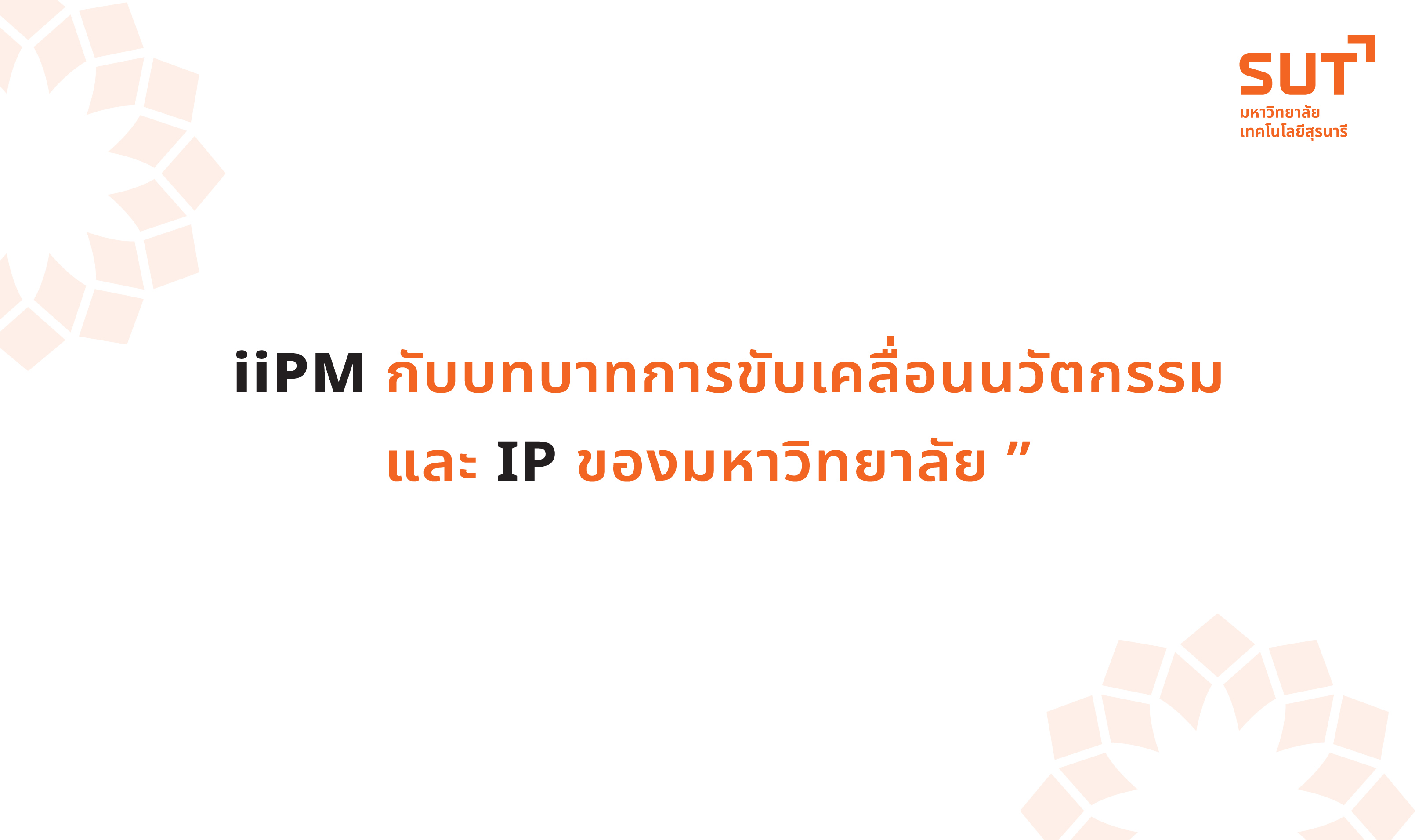ก่อนหน้า
กิจกรรมตอบคำถาม ลุ้นรับของรางวัลสุดพิเศษ ประจำเดือนมิถุนายน 2568

Thailand is in dire need of innovation if we should escape the middle-income trap and get growth beyond the current 2%. Entrepreneurial universities are an important potential contributor to innovation, but we need to dare to look beyond our own turf – more than 99% of the world market is outside Thailand. I know we have researchers at SUT that can contribute with innovations with global impact, and an important role of iiPM is to enable that impact. We are often the first contact point for a researcher in the innovation eco system, and we should always be involved as iiPM represents the university regarding the management of its intellectual assets. In this context, IP is a tool that we use to claim ownership over these intellectual assets, and it’s a way to e.g. control who benefits from the efforts and tax money that has been spent on research.
With the TRIUP Act came a greater focus on impact and the government made the universities responsible for managing the IP, but no funding came with this responsibility. Also, in Europe and the US, the regulations normally focus only on patentable inventions, and in many cases also software, but in Thailand the legislators have defined IP basically as new knowledge and even if it legally cannot be owned, we still have to treat it as property, and request “ownership” from the funding agency. The quasi “ownership” is on top of this conditional and can be withdrawn if we cannot show utilization within 2 years. At the same time anyone else in the world can use the same knowledge without any of this bureaucracy. On the other hand, if we don’t play this bureaucratic “game” we might in the future get issues with a messy “ownership” background – which can kill potential impact as e.g. a licensee or investor will identify this mess in the due diligence process. The only reason this is not a real problem already is that we yet haven’t had a hot case with substantial potential impact in Thailand. This broad definition of IP just adds work, and zero value.
The lack of funding is also a real issue, and it’s partly connected to the very wrong perception that IP is a source of revenue. IP is a cost, and potentially a high cost, which is why we should invest only when the potential revenue or impact can motivate that cost. IP is an investment to claim ownership, to control the utilization, and to add value to good research results. Yes, it’s free for universities to patent in Thailand, but the value of having a patent only in Thailand is very limited. It means that the invention is free to use in any other country in the world. Not to mention that the granting process in Thailand is so slow that we are generally talking about patent applications, and not granted patents, which of course also brings down the value in the eyes of a potential licensee or for a university spinout. We need resources to file patents outside Thailand, e.g. through the PCT process, and the university has to take a long-term perspective building an innovation and IP portfolio, not based on volume but based on quality. The holding company needs to get firmly established so that we e.g., when beneficial, can exchange licensing fees and royalties with ownership, to strengthen the chance of success for university spinouts.
SUT has many great researchers, and I wish we had more resources and a better functioning innovation eco system, so that more of the research would actually get the chance to have real impact. Long-term it could even generate positive cashflow for the university, but we are probably talking about 10+ years, based on what we have learned from, especially, the European universities that changed the regulations about ownership around 20 years ago. But in these countries both the governments and the universities have invested heavily in the capacities to manage innovation and IP – through e.g. easily available early soft funding and incubators with people with business skills. These governments and universities have also realized that not many researchers are, or should be, entrepreneurs.
Please contact iiPM to talk about your ideas, so we can help evaluate the potential impact and whether it is possible to create a sustainable competitive advantage, either through licensing or through creating a university spinout. It’s not always about creating revenues, it can also be to ensure open innovation, and the focus is to create impact.
ประเทศไทยอยู่ในจุดที่จำเป็นต้องเร่งขับเคลื่อนนวัตกรรมอย่างจริงจัง หากต้องการหลุดพ้นจากกับดักรายได้ปานกลาง และขยับอัตราการเติบโตทางเศรษฐกิจให้เกินกว่าระดับ 2% ในปัจจุบัน ซึ่งถือว่าน่าเป็นห่วงอย่างยิ่งมหาวิทยาลัยที่มีแนวคิดเชิงผู้ประกอบการ (Entrepreneurial Universities) ถือเป็นหนึ่งในกลไกสำคัญที่จะช่วยผลักดันนวัตกรรมของประเทศได้อย่างมีพลัง แต่เราต้องกล้าที่จะมองออกไปไกลกว่าพื้นที่ของตนเอง เพราะในความเป็นจริงแล้ว กว่า 99% ของตลาดโลกนั้นอยู่ “นอก” ประเทศไทย
ที่มหาวิทยาลัยเทคโนโลยีสุรนารี (SUT) เราเชื่อมั่นว่า นักวิจัยของเราหลายคนมีศักยภาพในการคิดค้นนวัตกรรมที่สามารถสร้างผลกระทบได้ในระดับสากล และบทบาทสำคัญของ สถาบันส่งเสริมนวัตกรรมและบริหารทรัพย์สินทางปัญญา (iiPM) คือการทำให้ผลกระทบนั้นเกิดขึ้นจริง iiPM มักเป็นจุดเริ่มต้นของนักวิจัยในการก้าวเข้าสู่ระบบนิเวศนวัตกรรม และในฐานะตัวแทนของมหาวิทยาลัยในการบริหารจัดการทรัพย์สินทางปัญญา เราควรมีส่วนร่วมเสมอ ในบริบทนี้ “ทรัพย์สินทางปัญญา” หรือ IP จึงไม่ใช่เพียงเครื่องมือทางกฎหมาย แต่คือเครื่องมือสำคัญในการ “อ้างสิทธิ์” เหนือผลงานวิจัยที่เกิดขึ้น เพื่อควบคุมการใช้ประโยชน์ และรักษาผลประโยชน์จากเงินภาษีและความพยายามของนักวิจัยให้เกิดคุณค่าสูงสุดพระราชบัญญัติส่งเสริมนวัตกรรม (TRIUP Act) ได้เพิ่มบทบาทให้มหาวิทยาลัยในการรับผิดชอบจัดการ IP โดยตรง แต่ในขณะเดียวกันก็ไม่ได้จัดสรรงบประมาณสนับสนุนภารกิจใหม่นี้มาด้วย
ขณะเดียวกัน ในยุโรปและสหรัฐอเมริกา กฎหมายเกี่ยวกับ IP มักมุ่งเน้นเฉพาะสิ่งประดิษฐ์ที่สามารถจดสิทธิบัตรได้ (และในบางกรณีรวมถึงซอฟต์แวร์) แต่ในประเทศไทย กลับมีการให้นิยามของ IP อย่างกว้างขวาง จนครอบคลุมไปถึง “องค์ความรู้ใหม่” แทบทุกชนิด แม้จะไม่สามารถถือครองโดยชอบด้วยกฎหมายได้ก็ตาม มหาวิทยาลัยยังคงต้องดำเนินการ “ขอครอบครอง” จากหน่วยงานผู้ให้ทุน ทั้งที่สิทธิดังกล่าวเป็นเพียง “การครอบครองเสมือน” และสามารถเพิกถอนได้ หากไม่สามารถแสดงการใช้ประโยชน์ภายในระยะเวลา 2 ปี ที่สำคัญในขณะเดียวกัน นักวิจัยหรือผู้ประกอบการในต่างประเทศสามารถนำความรู้เดียวกันไปใช้ได้อย่างเสรี โดยไม่ต้องผ่านขั้นตอนทางราชการที่ยุ่งยากแบบเดียวกับที่เราต้องเผชิญอย่างไรก็ตาม หากเราไม่ดำเนินการตามกระบวนการทางกฎหมายเหล่านี้ให้ถูกต้อง ก็อาจเกิดปัญหาในอนาคตได้ โดยเฉพาะอย่างยิ่งในกรณีที่มีนักลงทุนหรือลิขสิทธิ์ผู้ใช้มาตรวจสอบประวัติ IP (due diligence) แล้วพบความไม่ชัดเจนในการถือสิทธิ ซึ่งอาจเป็นอุปสรรคสำคัญที่ทำให้การนำผลงานไปใช้เชิงพาณิชย์ต้องหยุดชะงัก เหตุผลที่ปัญหานี้ยังไม่แสดงตัวอย่างชัดเจนในตอนนี้ เป็นเพราะประเทศไทยยังไม่เจอ “กรณีเร่งด่วน” หรือผลงานที่มีศักยภาพสูงจนเกิดผลกระทบเชิงพาณิชย์ระดับใหญ่จริง ๆ แต่เราควรเตรียมความพร้อมไว้ตั้งแต่วันนี้
นอกจากนี้ การขาดแคลนงบประมาณสนับสนุนก็เป็นปัญหาเรื้อรัง และส่วนหนึ่งมาจากความเข้าใจที่คลาดเคลื่อนว่า IP คือ “แหล่งรายได้” ทั้งที่ในความเป็นจริง IP คือ “ต้นทุน” ที่อาจสูงมากในบางกรณี เราจึงควรตัดสินใจลงทุนเฉพาะเมื่อเห็นศักยภาพของรายได้ หรือผลกระทบในระดับที่คุ้มค่ากับการลงทุนเท่านั้น IP จึงควรถูกมองว่าเป็น การลงทุน เพื่อการอ้างสิทธิ์ การควบคุมการใช้ประโยชน์ และเพื่อเสริมคุณค่าให้กับผลงานวิจัยที่ดี ไม่ใช่เครื่องมือหาเงินโดยตรง แม้ว่าการจดสิทธิบัตรในประเทศไทยจะไม่เสียค่าใช้จ่ายสำหรับมหาวิทยาลัย แต่สิทธิบัตรที่มีผลใช้เฉพาะในประเทศก็มีมูลค่าที่จำกัด เพราะไม่ได้ป้องกันการนำไปใช้ในประเทศอื่น ๆ ทั่วโลก อีกทั้งกระบวนการอนุมัติสิทธิบัตรในไทยยังล่าช้ามาก ทำให้โดยส่วนใหญ่เรายังอยู่ในขั้น “คำขอ” ไม่ใช่ “สิทธิบัตรที่ได้รับการอนุมัติ” ซึ่งยิ่งทำให้คุณค่าในมุมมองของนักลงทุนหรือลิขสิทธิ์ผู้ใช้ลดลง หากต้องการสร้างผลกระทบจริง เราจำเป็นต้องมีทรัพยากรเพียงพอสำหรับการยื่นจดสิทธิบัตรในต่างประเทศ โดยเฉพาะผ่านระบบ PCT (Patent Cooperation Treaty) และมหาวิทยาลัยจำเป็นต้องมีมุมมองระยะยาวในการสร้างพอร์ตโฟลิโอด้านนวัตกรรมและ IP ที่เน้น “คุณภาพ” ไม่ใช่แค่ “ปริมาณ” อีกหนึ่งกลไกสำคัญคือการจัดตั้งบริษัทโฮลดิ้งของมหาวิทยาลัยอย่างมั่นคง เพื่อให้สามารถใช้ IP ในการแลกเปลี่ยนกับหุ้น หรือค่าลิขสิทธิ์ในกรณีที่เป็นประโยชน์ ซึ่งจะเพิ่มโอกาสความสำเร็จให้กับบริษัทสตาร์ทอัพที่เกิดจากมหาวิทยาลัย
ที่ SUT เรามีนักวิจัยที่ยอดเยี่ยมจำนวนมาก และเราหวังอย่างยิ่งว่าจะมีทรัพยากรและระบบนิเวศนวัตกรรมที่เอื้อต่อการสร้างผลกระทบจริงจากงานวิจัยมากยิ่งขึ้น ซึ่งในระยะยาวอาจทำให้มหาวิทยาลัยสามารถสร้างกระแสรายได้กลับคืนมาได้จริง เพียงแต่เรากำลังพูดถึงการเดินทางที่อาจต้องใช้เวลากว่า 10 ปี จากบทเรียนที่เราได้เรียนรู้จากมหาวิทยาลัยในยุโรป ซึ่งได้เปลี่ยนแปลงกฎเกณฑ์เกี่ยวกับ IP มานานกว่า 20 ปีแล้ว โดยมีทั้งภาครัฐและมหาวิทยาลัยร่วมลงทุนอย่างจริงจังในการสร้างความสามารถด้านการจัดการนวัตกรรมและ IP ไม่ว่าจะเป็นการให้ทุนสนับสนุนในระยะเริ่มต้น (soft funding) หรือการจัดตั้งศูนย์บ่มเพาะ (incubator) ที่มีบุคลากรเชี่ยวชาญด้านธุรกิจร่วมด้วยสิ่งที่ประเทศเหล่านี้ตระหนักได้อย่างชัดเจน คือ “นักวิจัยไม่จำเป็นต้องเป็นผู้ประกอบการ” และในหลายกรณีก็ไม่ควรเป็นด้วยซ้ำ เราขอเชิญชวนนักวิจัยทุกท่านติดต่อ iiPM เมื่อท่านมีแนวคิดนวัตกรรม เพื่อให้เราร่วมกันประเมินศักยภาพ วิเคราะห์โอกาสสร้างผลกระทบ และกำหนดแนวทางสร้างความได้เปรียบอย่างยั่งยืน ไม่ว่าจะเป็นผ่านการให้ใบอนุญาต (licensing) หรือการจัดตั้งสตาร์ทอัพจากมหาวิทยาลัย
Professionalism
Relationship
Integrity
Delight